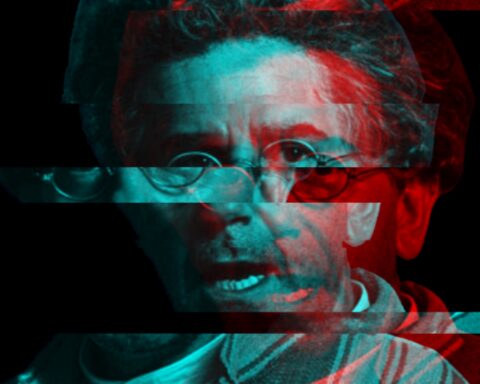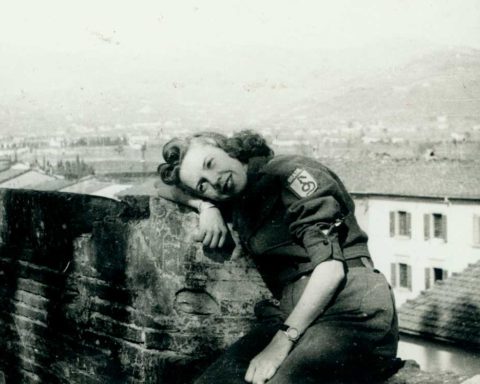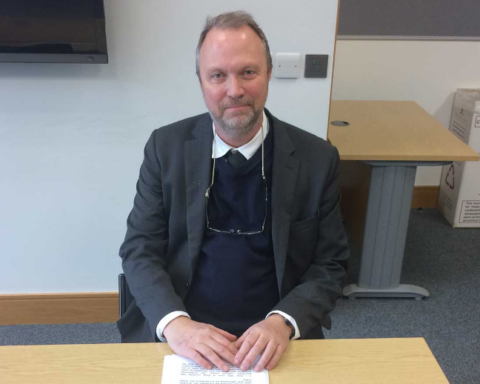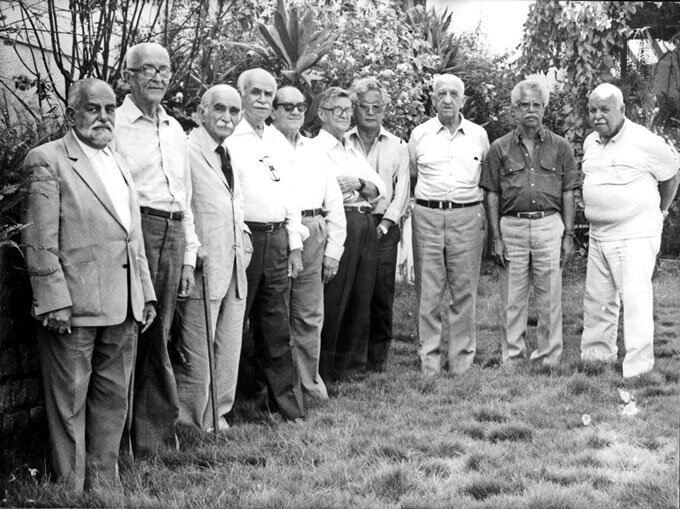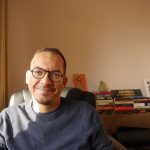The Belgian historian analyzes cases of censorship, persecution and even deaths of historians by governments and regimes that have tried to control the writing of history
Pedro Teixeirense interviews Antoon De Baets
“Shoot the historians when you fear their history – this is what some regimes have done throughout the centuries. Lamentably, the present age is no exception; it even has the worst record.” (Antoon De Baets, Historians killed for political reasons, p.22)
Nikolai Kondratiev was executed by a firing squad on September 17, 1938. Jian Bozan committed suicide to escape torture on December 18, 1968. These men shared much more than a tragic death. They shared a profession, a craft and the courage to defend ideas that challenge the official version of our collective history. The background of the death of the Soviet economist and the Chinese Marxist historian is the starting point of the most recent book published by Professor Antoon De Baets. Crimes against History is a fascinating work in which the historian addresses the censorship of history.
The undisputed quality of Antoon De Baets’s oeuvre dates back to his early work more than three decades ago. Professor De Baets has coordinated the Network of Concerned Historians since 1995, an international network that seeks to discuss and denounce historians who are under threat. Before and after the launch of this initiative, Antoon De Baets has worked on issues such as the subversive power of historical parallels, the legal framework of historical writing, and the complex and fascinating relationship between historical writing and democracy.
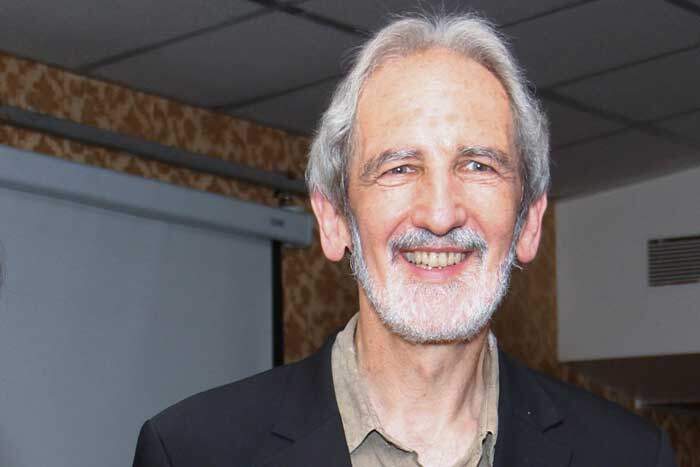
Chair of History, Ethics and Human Rights at the University of Groningen – the Netherlands – Antoon De Baets has brought to the public a captivating book about a variety of what he reports as “crimes against history”. His work adopts a global approach when he dissects the forms that censorship tends to assume against history. In his own words, his book “takes a look behind the curtains where censors cut stories only to paint a polished version of the past.”
In this interview, Professor Antoon analyzes some of the most relevant aspects of his book. He explains the origin of his work with the Network of Concerned Historians and his relationship with human rights organizations. After presenting concepts such as “crimes against history” and “censorship of history,” Professor De Baets comments on initiatives such as the “Party-free Education” Program. There is also a controversial debate on the nature of Communist worldview and the reasons that explain a greater number of casualties among history producers.
As Professor Antoon argues “exposing the censorship of history is the beginning of its end”.
In your most recent book – Crimes Against History – you address the issue of censorship of history. In particular, the book deals with the more drastic measures that censors use to control historiographical production. The cases presented in your book are registered, collected and analyzed in your long-term project named Network of Concerned Historians. Would you like to start this conversation by talking about this project and how was the idea of writing this book born?
I established the Network of Concerned Historians in 1995 with one simple goal in mind: to build a bridge between the world of international human rights organizations and the world of historians. With a background as an academic historian and as a member of Amnesty International since the 1970s, it occurred to me that while international human rights organizations waged campaigns on behalf of persecuted historians from time to time, most historians were not aware of these efforts. I started to publish these campaigns on a website (http://www.concernedhistorians.org) each time they were launched and to mail Annual Reports about the persecution of historians and the censorship of history worldwide to interested colleagues (25 of such reports have been published in the meantime and 3,300 colleagues are reached today). The website also contains some unique collections such as thematic documents of international organizations relevant to historians; legal cases in which history or historians are involved; and codes of ethics for the historical and related professions.
As I collected hundreds of cases over the years, it dawned on me that the harassment and persecution of historians did not stop with the usual tools (censorship of their work, dismissal from their job, litigation on spurious charges) but that, in extreme circumstances, historians were also killed for political reasons, including for producing dangerous historical work that challenged official historical truths. Once I concentrated on this brutally persecuted minority of historians, I noticed that a very dramatic story was to be told there. That was the start for my book Crimes against History that came out this year (2019).
In the introduction of your book, you draw attention to the fact that, in order to address the censorship of history, one must recognize that there are several equally fair approaches to this matter. One of them is to look at what you call “extreme measures”: draconian ways of controlling history by using tools that result in the destruction of history producers and the work they had produced. How can we define the concept of “Crimes against history”?
First of all, I did not limit my horizon to professional historians. Rather, I broadened the scope to what I call “history producers,” that is, all those involved, professionally or otherwise, in the collection, creation or transmission of history. For my definition of “crimes against history,” I was inspired by the formulation of “crimes against humanity” as it is used by the International Criminal Court. I took “crimes against history” to mean any of the following acts when committed as part of a widespread or systematic attack pursuant to or in furtherance of a state or non-state policy: the assassination and disappearance of history producers; public personal attacks on history producers through hate speech, defamation, and malicious prosecution; intentional destruction of cultural heritage and disinformation, including genocide denial, and censorship of history.
In their essence, these crimes against history are abuses of history that constitute violations of human rights. In particular, they violate the rights to life, fair trial, free expression, equality, culture, and science of these history producers (and often of their audiences).
“Censorship” or “Freedom of speech” are terms associated primarily with the work of journalists, artists and other media-related careers. In fact, it can be said that we rarely hear of “censorship of history.” What is “censorship of history”? Why are historians censored?
The legal definition of the censorship of history usually encompasses restrictions on views about the past before they are expressed (“pre-censorship”) and restrictions on views about the past after they are expressed (“post-censorship”). The characterization that I use in my book starts from this legal definition but often goes beyond it. In this broader sense, “censorship of history” is the systematic control over historical facts or opinions and their exchange imposed by, or with the connivance of, the government or other powers. The typical form of censorial control is suppression. The twin concept of the censorship of history is historical propaganda, a term that I therefore defined symmetrically, namely as the systematic manipulation of historical facts or opinions by, or with the connivance of, the government or other powers.
Historians are censored for a wide variety of reasons. One of the tables in my book that I particularly love gives an overview of no less than 300 types of charges and accusations that have been directed at historians in lawsuits against them after 1945. Only some of these legal charges and accusations are compatible with human rights, but most are not. If they are compatible with human rights (charges such as privacy invasion, defamation, and hate speech, for example), they are often too broadly formulated, arbitrarily applied, and prone to abuse. And needless to say, the charges often do not correspond to the real reasons why history producers are prosecuted. In contrast to the charges, the accusations often do not find a basis in existing law, let alone in human rights standards, at all. In sum, while some charges and accusations are justified, many are politically motivated, blown-up, or outright false and invented for the occasion. They are tailored to the needs of power and do not serve justice, but repression. They can lead to malicious prosecution, which is a crime against history. Among the many reasons for the censorship of history as reflected in these charges and accusations, one of the most important is that the work of historians can challenge official historical truths and thereby undermine the legitimation of power and the official view of a nation’s collective memory. As such, dissident history is subversive and dangerous.
Could we discuss the concept of “self-censorship”? You wrote that self-censorship “is the ultimate goal of any censorship apparatus: where it is successfully established, intimidation and fear spread so effectively that external control becomes superfluous”. I would like to ask you if are you familiar with the “Party-free Education” Program that intends to modify the Brazilian National Education Law? According to this movement, teachers should not educate, but only instruct. In other words, teachers should only convey the “specific topics of school subjects” without discussing the values or reality of the students. Is it possible to teach history apart from reality? Could we consider this movement as a form of censorship of history?
I do not know the “Party-free Education” Program or how it affects history education. Therefore, I cannot judge whether this program would constitute censorship of history. One should collect examples of consequences that this Program has in the field of history education to diagnose this movement. I would be curious to see how the Supreme Federal Court (or a comparable court) deals with a charge against it. At first sight, aspects of the program seem to go against the right to education (article 13 of the International Covenant on Economic, Social and Cultural Rights), as it is explained by the United Nations Committee on Economic, Social and Cultural Rights (CESCR) in its General Comment no. 13 on the Right to Education from 1999. In particular, the standard of “acceptability” – the form and substance of education, including curricula and teaching methods, have to be acceptable (e.g. relevant, culturally appropriate and of good quality) to students and, in appropriate cases, parents – seems to be under heavy pressure. The CESCR has a complaint mechanism and the power to issue so-called Concluding Observations about Brazil. It seems to me that also the United Nations Special Rapporteur on the Right to Education could be invited to issue an urgent appeal or an allegations letter on the matter.
In your book you defend the thesis that a “law-driven History” concept explains why “killing history producers for history-related reasons played a more notable role in China and the USSR than elsewhere”. Could you explain why the Communist worldview caused a greater number of casualties among history producers?
My thesis is not that each and every Communist regime tended to kill its dissident historians, nor is it that non-Communist regimes rarely kill their dissident historians; it is that the Communist ideology provides special incentives, particularly in the Stalinist USSR and Maoist China. While history is an important source for the legitimation of power in most dictatorships, the more central the role of history in the dictatorial ideology is, the more devastating the impact of censorship on historical writing will be.
In principle, totalitarian regimes were more dangerous than authoritarian ones as they not only tried to silence but also to convert their citizens. Among totalitarian regimes, Communist ones occupy a special place because more than in other totalitarian regimes history plays a central role in their world view. The Communist world view, in fact, is governed by the theory of historical materialism. Communist regimes conceive of history as a development driven by laws and, not less important, these laws are interpreted according to the ruler’s logic. These laws deny the contingency of unfolding events; a grand historical plan is supposed to determine them. Such a law-driven theory of history needs elaborate historical writing to sustain it, which, in turn, increases the numbers of history producers involved, hence the probability of deviation and error, hence the urgency of suppression of such deviation and error. When the writer Maxim Gorky asked for clemency for the Grand Duke Nicholas Mikhailovich Romanov, a historian and member of the Tsarist family, Lenin replied: “The Revolution does not need historians.” The Grand Duke was shot in 1919.
It is plausible to assume that Communist regimes attacked the scholarly foundations of the profession more profoundly than other totalitarian regimes in order to mold the presentation of past events to their historical laws, with persuasion if possible, with violence if necessary. By contrast, ideology tended to be more essentialist (defined by perennial characteristics) in right-wing totalitarian regimes; hence, the outlook of the latter regimes was usually less rigidly historical – although totalitarian unpredictability generally had a deeply intimidating impact also there.
In the second part of your book, you discuss how censorship itself can undermine its own effects. One of the most fascinating topics in this regard is what you call the “resistance effect”. Actually, this chapter can be read as a tribute to those who dedicated themselves to creative and courageous strategies to overcome the government of authoritarianism. What can be learned from such examples of the fight resistant to crimes against history?
In the last chapter of Crimes against History I tried indeed to sketch a brief history of resistance against the crimes against history, I must admit that it is difficult to measure the impact of resistance. Firstly, for I have not told the stories of all known acts of resistance. I had to be selective. And I am convinced that thousands of small acts of courage remain unknown to all or to most. So we are ignorant of many resistance acts. Secondly, the examples of resistance that I gave were mutually incomparable in that they spanned a broad range of activities: from the symbolic to the clandestine to the openly defiant. Some actions required bravery or quixotry, while others consisted of small, almost invisible gestures made without fanfare and often hidden behind a screen of ambiguity or silence. Some were spontaneous, others carefully planned or deliberately provocative. Thirdly, it should never be forgotten that many outside the historical profession made efforts on behalf of the persecuted historians. Novelists, playwrights, journalists, storytellers, and singers often took care of suppressed historical interpretations, keeping them alive when the collective memory was in danger of extinction because the silenced and silent historians were not able to refute the heralded truths of official historical propaganda. I have called this the “substitution effect”.
Yet there is something like a tradition of resistance to cherish. Much was saved, materially (archives, works, monuments, education) as well as symbolically (principles and values). Assaults were countered, secrets uncovered, lies unmasked, distortions denounced, indifference neutralized, sterility fertilized, distrust disarmed. Of course, much was destroyed and ruined by ruthless power as well. In many cases, it took years, if not generations, to rebuild what was torn down. Often, resistance did not – and simply could not – counterbalance systemic violence. And often losses and disappearances were irreparable.
If the short-term impact of resistance is difficult to measure, this is even more the case with its long-term impact. But here too, there is reason for hope. Over time, a surprising amount of acts became examples of moral courage, because the historians involved did not chase any effect but did what they thought was responsibly exercising their craft with reckless disregard of warnings and consequences. If there is a tradition at all, then, it is a tradition of holding high the standards of scholarly integrity in the face of likely censorship. Intrinsically fragile as they are, acts of moral courage possess one powerful characteristic: they can inspire long after the facts to which they refer have disappeared. As long as they are retold, stories of commitment and integrity inspire hope and pride. This can be called the memory effect of the fight against the crimes against history.
Antoon De Baets: Chair of History, Ethics and Human Rights at the University of Groningen – the Netherlands – Antoon De Baets has brought to the public a captivating book about a variety of what he reports as “crimes against history”. His work adopts a global approach when he dissects the forms that censorship tends to assume against history. In his own words, his book “takes a look behind the curtains where censors cut stories only to paint a polished version of the past.”
Pedro Teixeirense: PhD in History (Federal University of Rio de Janeiro and Institut für soziale Bewegungen – Ruhr Universität Bochum). He worked as a high school teacher in several institutions. With over ten years of experience, he has worked as a researcher and consultant in public and multilateral agencies. Conducted research with the Federal Senate in Brazil and UNESCO programs. Since 2005, he has served as a Consultant and Researcher on papers on Brazilian political history, education, justice, citizenship, public security and human rights. Throughout 2014, Pedro worked as a researcher at the United Nations Development Program (UNDP), as a Research Analyst with the National Truth Commission (CNV). In 2016, Pedro participated in the process of creating and developing the History of the Dictatorship website. In 2018, he won the 4th Edition of the National Archives Revealed Memories Research Prize.
How to cite this interview
DE BAETS, Antoon. The historian as an enemy: interview with Antoon De Baets (Interview). Interview given to Pedro Teixeirense. In: Cafe Historia – History made with clicks. Available at: https://www.cafehistoria.com.br/interview-antoon-de-baets/. Posted on Nov 25 2019.

